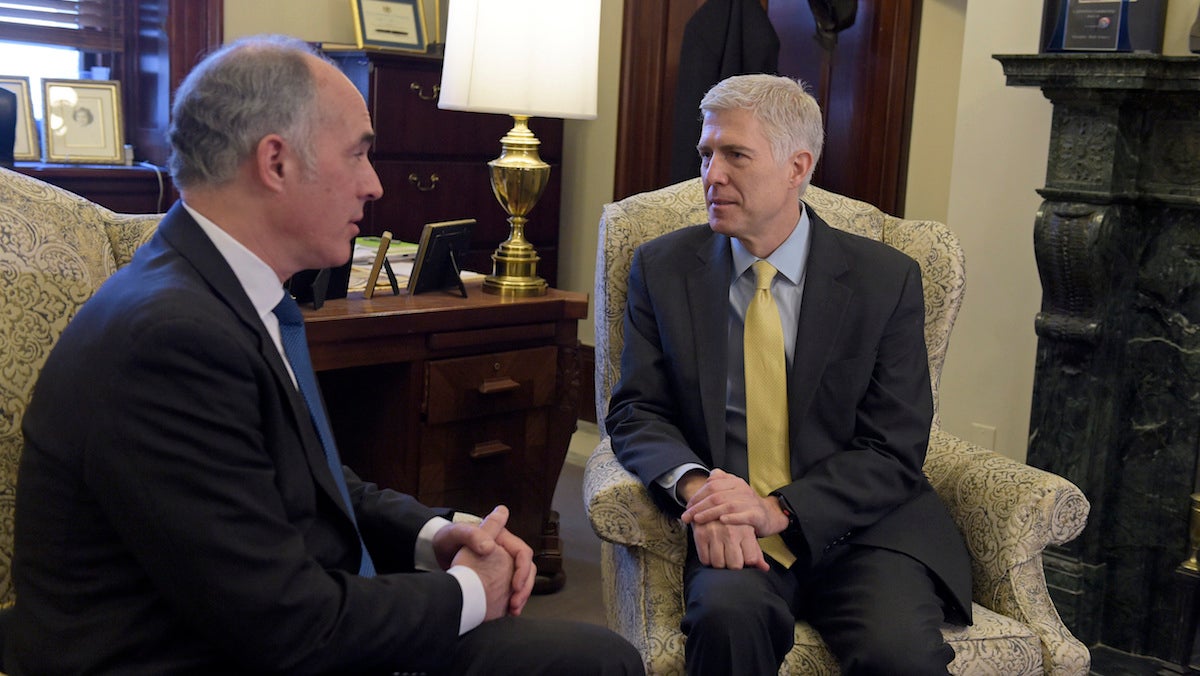On Gorsuch decision, Casey put people before politics

Sen. Bob Casey, Jr., D-Pa., left, talks with Supreme Court Justice nominee Neil Gorsuch at the beginning of their meeting on Capitol Hill in Washington, Thursday, Feb. 16, 2017. (AP Photo/Susan Walsh)
Despite his tenuous political position as a Democrat facing reelection in a state won by Republican President Donald Trump, U.S. Sen. Bob Casey chose his constituents over threats from a well-funded opposition.
In announcing his intention to vote no on the confirmation of Supreme Court nominee Neil Gorsuch, Casey listened to constituents like myself who asked him to vote against Gorsuch—a judge with a penchant for putting corporations before people.
In an age when too many politicians value their own interests more than the constituents they represent, Casey chose the people over himself. For that, he has earned my respect.
Still, announcing his intention to vote against Gorsuch’s nomination is politically dangerous, especially since a coalition of conservative groups led by the Judicial Crisis Network pledged to spend up to $10 million to help get Gorsuch confirmed.
If such a coalition could spend that kind of money to support Gorsuch, it could also spend similar money to oppose Casey. I asked the Senator why he was willing to take such a political risk.
“Politics should play no role in my duty to review an appointee to the most powerful court in the world,” Casey said in an emailed response. “Judge Gorsuch’s record indicates that he will likely rule in a way that will stack the deck against ordinary Americans, that will fail to uphold protections for those with disabilities and that will protect corporate interests above all else. I cannot, in good faith, vote to confirm someone who I do not believe will interpret the law in a way that protects all Americans.”
Of course, not everyone agrees with Casey’s decision, and Gorsuch’s supporters have already begun to shape their message.
Republicans have painted Democratic opposition to Gorsuch as payback for the Republicans’ refusal to vote on Merrick Garland, former President Barack Obama’s Supreme Court nominee.
But I know there was more at stake for Casey than eduring GOP spin. He also risked losing votes from constituents who were concerned about President Trump’s Supreme Court nominee.
Having reviewed Gorsuch’s record for myself, I saw a judge who voted too often against workers—a man who seemed to also lean toward restricting voting rights. I encouraged listeners to my morning radio show to call and email Casey to voice their disapproval of Gorsuch. But I wasn’t alone.
Liberal groups also arranged phone calls and emails to Casey’s office. A group called People for the American Way ran a modest, weeklong television campaign against Gorsuch.
The efforts paled in comparison to the millions spent by conservatives supporting the nominee.
I asked Casey if constituent phone calls and emails played a major role in his decision to come out against Gorsuch.
“As with every vote, constituent input plays a vital role in my decision making process,” Casey said via email. “I began the ‘advice and consent process’ with an open mind. I arrived at my vote decision only after reviewing constituent input, meeting with Judge Gorsuch, studying hours of his opinions and consulting a variety of legal scholars. This process, including constituent input, allowed me to make an informed and thoughtful decision.”
I believe Casey went through that process, but I also believe constituent input played a huge role role in his final decision. Constituents, after all, are the ones who will vote in next year’s election.
During that election, Casey’s record will be laid bare. We’ll see that he is not some wild-eyed liberal whose views are in lockstep with the left. We’ll note that he has occasionally voted with conservatives, much to the chagrin of his party.
We will not agree with everything he has stood for. We will not like every decision he’s made. But on this, the decision to stand against a lifetime appointment for Supreme Court nominee Neil Gorsuch, we can wholeheartedly agree.
As one of Bob Casey’s constituents, I plan to remember this decision next year.
Listen to Solomon Jones weekdays from 7 to 10 am on 900 AM WURD
WHYY is your source for fact-based, in-depth journalism and information. As a nonprofit organization, we rely on financial support from readers like you. Please give today.


